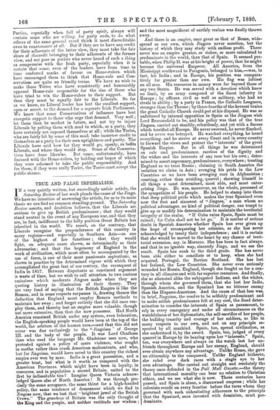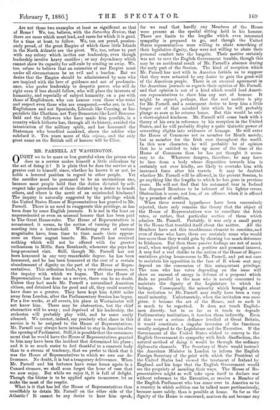TRUE AND FALSE IMPERIALISM.
IN a very quietly written, but exceedingly unfair article, the Saturday Review of last week pleads the cause of the Jingo. We have no intention of answering the article, for as to its main thesis we can find no common standing-ground. The Saturday Review asserts, and doubtless believes, that the Liberals are anxious to give up British predominance ; that they would stand neutral in the event of any European war, and that they are, in fact, indifferent to the lofty position Great Britain has inherited in the world. We assert, on the contrary, that Liberals recognise the preponderance of this country in many regions—and especially in Southern Asia—as one of the highest of her functions ; that they would fight, on adequate cause shown, as determinedly as their adversaries; and that the hegemony of England in the work of civilisation, which must often be accompanied by the use of force, is one of their most passionate aspirations, as shown in practice by the determined vigour with which they accomplished the great feat of our century, the reconquest of India in 1857. Between disputants so convinced argument is waste of time, but we wish to call attention to two curious omissions which moderate Jingoes make when they are quoting history in illustration of their theory. They are very fond of saying that the British Empire is like the Roman, and in some respects surpasses it, drawing thence the deduction that England must employ Roman methods to maintain her sway ; and forget entirely that she did once em- ploy them, and thereby lost an empire more valuable, though not more extensive, than that she now possesses. Had North America remained British under any system, even federation, the English-speaking people would have been at the top of the world, the arbiters of the human race,—and that this did not occur was due exclusivejy to the " Jingoism " of George III. and the body of the people. It was Lord Chatham then who used the language Mr. Gladstone uses now, who protested against a policy of mere violence, who sought to soothe rather than crush American malcontents, and who, but for Jingoism, would have saved to this country the richest empire ever won by man. India is a great possession, and a greater trust, but what is it worth as compared with the American Provinces, which might have been in loyalty, in resources, and in population a second Britain, united to the first by indissoluble ties ? Imagine Queen Victoria acknow- ledged Queen also of North America! It was through pre- cisely the same arrogance, the same thirst for a high-handed policy, the same insolence of demeanour which we find in Jingoes now, that we lost that "brightest jewel of the British Grown." The grandeur of Britain was the only thought of the Bing and the people, and neither rectitude nor wisdom ; and the most magnificent of earthly realms was finally thrown away.
And there is an empire, once great as that of Rome, wide- spread as our own, which Jingoes never mention, but the history of which they may study with endless profit. There never was an empire greater, or richer, or more calculated to predominate in the world, than that of Spain. It seemed pro- bable, when Philip II. was at his height of power, that he might become the universal Emperor. All America, from the Mississippi southward to Patagonia, belonged to him,—was, in fact, his India ; and in Europe, his position was compara- tively far greater than our own. His flag was loftiest on all seas. His resources in money were far beyond those of any two States. He was served with a devotion which knew no limit, by an army composed of the finest infantry in Europe ; by officers, civil as well as military, who had no rivals in ability ; by a party in France, the Catholic Leaguers, stronger than the Throne ; by three-fourths of the keenest brains the great Catholic Church could put at his disposal. He was as unfettered by internal opposition in Spain as the Jingoes wish Lord Beaconsfield to be, and his policy was that of the true Jingoes, carried out steadily, relentlessly, and yet with a finesse which terrified all Europe. He never swerved, he never flinched, and he never was betrayed. He watched everything, he heard everything, and he strove at every Court and in every country to forward the views and protect the "interests" of the great Spanish Empire. But in all things he was determined on rule and predominance, careless of the dignity and the wishes and the interests of any race but his own ; deter- mined to assert supremacy, predominance, everywhere ; treating England as we treat Russia ; claiming in South America the isolation we claim in Asia ; avenging his pride in the Low Countries as we have been avenging ours in Afghanistan ; courting, rather than avoiding, quarrel ; showing himself in all things a most determined, most able, and most enter- prising Jingo. He was, moreover, on the whole, possessed of the sympathies of his people. He helped to stamp into them that deep political pride which makes the true Spaniard even now the first and sincerest of "Jingoes," a man whom no political advantages, no kind of political danger, can tempt to give up or modify his determination to maintain the territorial integrity of the realm. "If Cuba ruins Spain, Spain must be ruined ; for Cuba shall not be let go." It is matter of serious doubt in Spanish America whether Spain has ever given up the hope of reconquering her colonies, as she has never acknowledged by treaty their independence ; and it is certain that she would be moved to the heart by any chance of terri- torial extension, say, in Morocco. She has been in fact always, and that in no ignoble way, sincerely Jingo, and we see the result. Spain has sunk to the third grade. She has never been able either to conciliate or to keep, when she had acquired, Portugal, the Iberian Scotland. She has lost her Ireland, the Low Countries. She never even seriously wounded her Russia, England, though she fought us for a cen- tury in all climates and with far superior resources. And finally, she so alienated alike the subjugated Indians, and the whites, through whom she governed them, that she lost her India, Spanish America, and the Spaniard has no bitterer enemy than the Hispano-American. And the cause of that loss was, in brief, Jingoism, the resolve to be selfishly predominant and to make selfish predominance felt at any cost, the fixed deter- mination to consider the interests of Spain as paramount, to rely in every emergency and under all circumstances on the watchfulness of her diplomatists, the self-sacrifice of her people, the bulldog tenacity and courage of her soldiers, so like in many respects to our own, and not on any principle re- spected by all mankind. Spain, too, spread civilisation, as she understood it, by the sword. Spain, too, judged of every quarrel in Europe by its bearing upon her "interests." Spain, too, was everywhere and always on the watch lest her un- friends throughout Europe and her enemy, England, should ever obtain anywhere any advantage. Unlike Rome, she gave no citizenship to the conquered. Unlike England hitherto, she ruled over dark races with a single eye to her own advantage. She carried out straight and resolutely the theory once defended in the Pall Mall Gazette,—the theory that international morality can bear no relation to Christian ethics, and we see what she is now. Three centuries have passed, and Spain is alone, a discrowned empress ; while her colonists recede on every frontier before the races whom they governed with such unhesitating adherence. to the principle that the Spaniard, once invested with dominion, mug pre- dominate. Are not these two examples at least as significant as that of Rome I We, too, believe, with the Saturday Review, that there are races which must lead, and races for which it is good, for a time at least, to follow. We, too, are proud, passion- ately proud, of the great Empire of which these little Islands in the North Atlantic are the pivot. We, too, refuse to part with any colony which invites our leadership, even though leadership involve heavy sacrifice ; or any dependency which cannot show its capacity for self-rule by sending us away. We, too, refuse to believe that an extension of our Empire must under all circumstances be an evil and a burden. But we desire that the Empire should be administered by men who are inspired with the love of guidance and not of predomin- ance, who prefer leadership to despotic power, who will do right even if loss should follow, who will place the interests of humanity, and especially of subject humanity, on a par with those of Englishmen, who can honour even those who resist and respect even those who are conquered,—who are, in fact, Englishmen and not Spaniards, Liberals like Canning. or Im- perialists like Chatham, not Tory Democrats like Lord Beacons- field and the followers who have made him possible, in a country which hitherto has, through all its history, avoided the intoxication of the military spirit, and has honoured the Statesman who benefited mankind, above the soldier who subdued it. Ten years more of this regime, -and the only great name on the British roll of honour will be Clive.



































 Previous page
Previous page